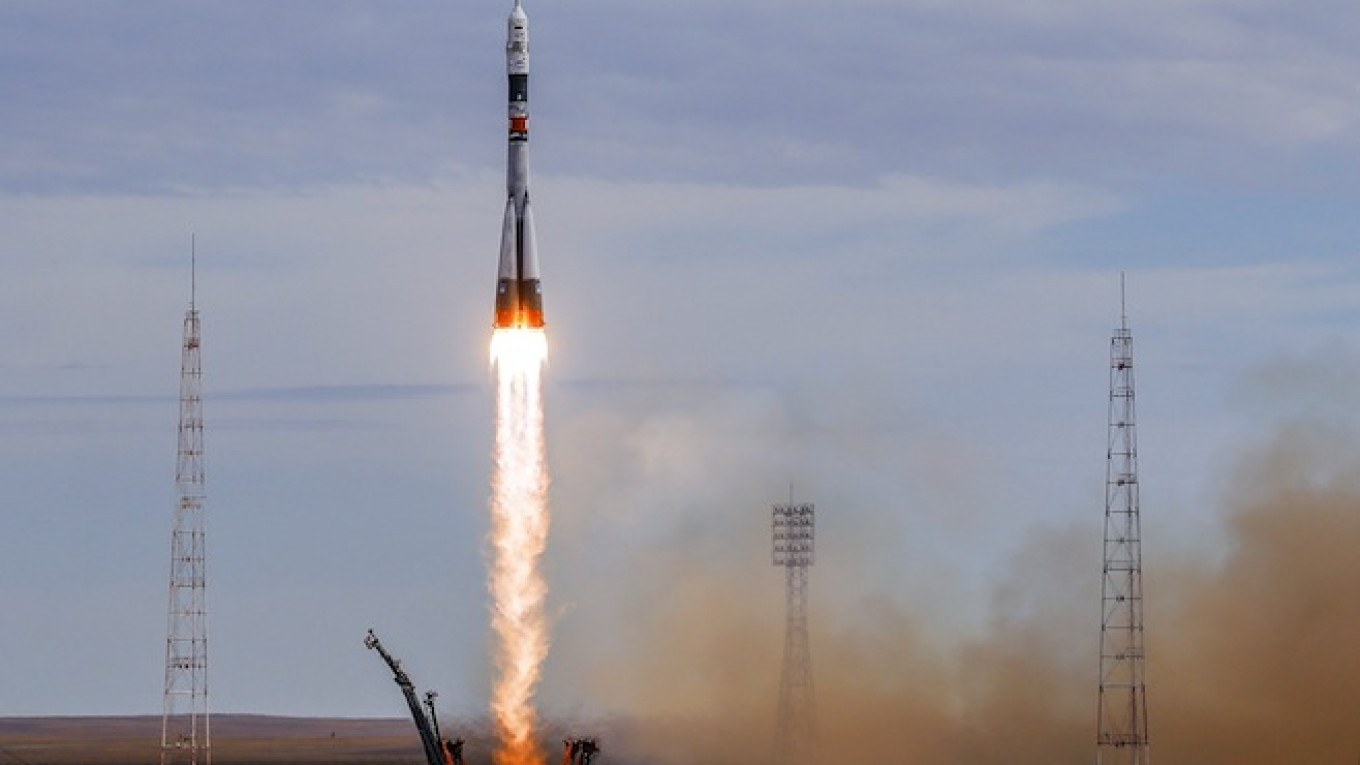A Russian Soyuz rocket carrying a three-man international crew, including Denmark's first astronaut, roared off on Wednesday from the Baikonur Cosmodrome in Kazakhstan, beginning a two-day journey to the International Space Station.
The rocket carrying the Soyuz TMA-18M spaceship lifted off to the $100 billion orbiting laboratory at 6:37 a.m. Moscow time, leaving just a puff of white smoke in the sky.
The crew is commanded by veteran Russian cosmonaut Sergei Volkov, joined by rookie Andreas Mogensen from the European Space Agency and Aidyn Aimbetov, another first-time space flyer from Kazakhstan's space agency Kazcosmos.
ESA dubbed Mogensen "Denmark's Gagarin," a reference to the Soviet cosmonaut and first man in space, Yury Gagarin.
The Dane told a pre-flight news conference on Tuesday that he had shaved his right leg to allow Volkov to better apply electrodes during scientific experiments in space.
One of Mogensen's jobs will be to test new equipment on Danish-made exercise bikes, ESA said.
The Danish exercise bikes — with no seats as none are needed in gravity-free conditions — were launched in 2001 and have been replaced or upgraded several times since. They help astronauts battle the negative impact of weightlessness.
Aimbetov, the third ethnic Kazakh in space, said he was taking dried mare's milk and traditional Kazakh cheese to orbit. Fermented mare's milk, or "kymyz," is popular among nomadic cultures of Central Asia.
While in space, he will wear a special dosimeter to study the effects of space radiation on the brain.
Volkov is the first son of a cosmonaut who also flew to the 15-nation space outpost.
"It's our family tradition already to carry Kazakhs into space," joked Volkov, whose father, Alexander Volkov, commanded a Soyuz spaceship that took the first-ever Kazakh cosmonaut, Tokhtar Aubakirov, into space in 1991.
Mogensen and Aimbetov are set to return to Earth on Sept. 12, together with veteran Russian cosmonaut Gennady Padalka, 57, who has been working aboard the ISS since March.
By then, Padalka will have racked up a total of 878 days in space, more than any other person.
Volkov will return to Earth in March together with NASA astronaut Scott Kelly and Russian Mikhail Korniyenko, who will have spent one year in space by that time.
The Soyuz rocket will take two days to reach the ISS, rather than a six-hour approach usually taken in recent years.
Russia's Roscosmos space agency said the altitude of the station, boosted in July to avoid space debris, requires the slower approach.
A Message from The Moscow Times:
Dear readers,
We are facing unprecedented challenges. Russia's Prosecutor General's Office has designated The Moscow Times as an "undesirable" organization, criminalizing our work and putting our staff at risk of prosecution. This follows our earlier unjust labeling as a "foreign agent."
These actions are direct attempts to silence independent journalism in Russia. The authorities claim our work "discredits the decisions of the Russian leadership." We see things differently: we strive to provide accurate, unbiased reporting on Russia.
We, the journalists of The Moscow Times, refuse to be silenced. But to continue our work, we need your help.
Your support, no matter how small, makes a world of difference. If you can, please support us monthly starting from just $2. It's quick to set up, and every contribution makes a significant impact.
By supporting The Moscow Times, you're defending open, independent journalism in the face of repression. Thank you for standing with us.
Remind me later.


